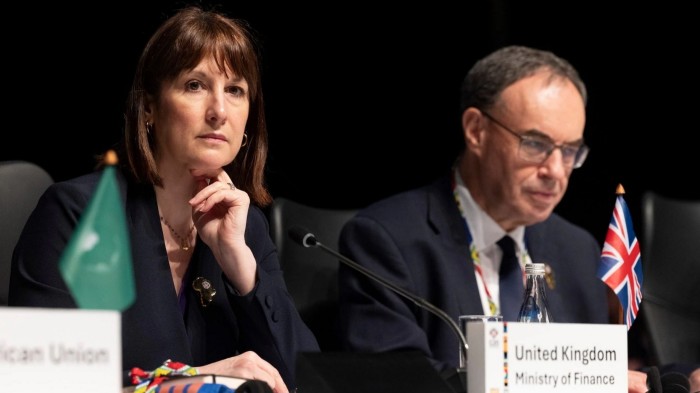Unlock the Editor’s Digest for free
Roula Khalaf, Editor of the FT, selects her favourite stories in this weekly newsletter.
Bank of England governor Andrew Bailey intervened to stop a meeting that chancellor Rachel Reeves tried to secure between financial watchdogs and Revolut, according to people familiar with the matter, in a new sign of friction over the way the City is regulated.
Reeves, who wants Revolut to be fully authorised as a bank as quickly as possible, had tried to set up a three-way meeting with Treasury officials alongside the fintech and the BoE’s Prudential Regulation Authority, which supervises banks and is headed by Sam Woods.
The meeting had been intended to discuss Revolut’s ambitions to become a fully fledged UK bank, according to the people familiar with the matter. While Revolut’s application for a banking licence was approved last year, it is still yet to be fully authorised.
However, the meeting was cancelled after Bailey intervened, the people said, amid concerns that the bank’s regulation should be independent from political interventions. The events took place in recent weeks, one of the people said.
Last week Bailey publicly signalled his frustration with some of Reeves’ zeal in streamlining City regulation, including warning of the dangers of going too far in reforming ringfencing rules that forced UK banks to separate their retail and investment banking activities.
“It has established itself as part of the system and to me it would not be sensible to take it away at this point,” Bailey told MPs, referring to rules introduced to avoid a repeat of the 2008 financial crash. He added: “We can’t compromise on basic financial stability.”
Bailey, speaking at the Treasury committee, also distanced himself from comments Reeves made in her Mansion House speech this month that some regulation was acting as “a boot on the neck of business”. Bailey said: “I don’t use those terms — let me say that.”
Reeves’ allies insisted that the chancellor was pleased with the way financial services regulation was developing to support growth and that her comments had been aimed at regulators in other parts of the economy.
They confirmed Reeves wanted to see Revolut win full regulatory clearance “as soon as possible”, adding: “Revolut are a really important global bank based in the UK. But that is a process being led by the PRA at a working level.”
One colleague of Bailey said he had been “really pissed off” by Reeves’ comments about “boots on necks”, but the chancellor’s team insisted that personal relations were very good.
The Treasury said: “The chancellor and the governor have a strong and productive relationship and the government fully supports the operational independence of the Bank of England.” It declined to comment on the abortive Revolut meeting. The BoE and Revolut declined to comment.
A person close to the BoE said: “We have a productive relationship with the chancellor and with the Treasury.”
Last year Revolut was approved for a UK banking licence, after a three-year wrangle with regulators. The lengthy process was complicated by Revolut’s size: the company has nearly 11mn customers in the UK and more than 50mn worldwide.
That approval has triggered a “mobilisation” stage during which time Revolut’s banking division can accept total deposits of just £50,000 while building out its controls and infrastructure.
The PRA has previously indicated that it hoped for the phase to end after 12 months, but that date passed on July 25. Both Revolut and the PRA have previously said that this is not a firm deadline, and that there might be a number of reasons why the mobilisation period could take longer.
One person close to Revolut said the company wanted the process to have concluded before now. They added that Revolut had been engaging with the government on the matter, but that as the PRA was independent these efforts had limited impact.
The $65bn privately held company is currently considering where to list if and when it goes public. The Financial Times has previously reported that the company would favour a New York listing.
Nik Storonsky, co-founder of Revolut, said in 2023 that he did not “see the point” of listing in London due to the UK’s regulatory regime.
The chancellor is trying to persuade Revolut to reconsider listing in the UK, which would be a big shot of confidence after three years of drought for IPOs.
Reeves has seized several opportunities to push regulators to take a more growth-friendly approach, including promising to overhaul the Financial Ombudsman Service that banks have criticised for being too generous to consumers.
She also sought to intervene in this year’s Supreme Court case over whether banks should pay billions of pounds in redress over car loans. The court rejected Reeves’ request, but she is considering legislation to shield the banks from the cost if the judgment due on Friday goes against them.
Additional reporting by Martin Arnold





1 Comment
bea4xt